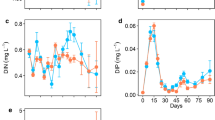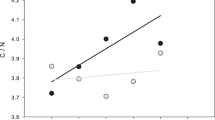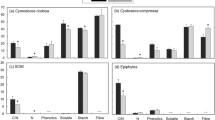Abstract
Ocean warming is anticipated to strengthen the persistence of turf-forming habitat, yet the concomitant elevation of grazer metabolic rates may accelerate per capita rates of consumption to counter turf predominance. Whilst this possibility of strong top-down control is supported by the metabolic theory of ecology (MTE), it assumes that consumer metabolism and consumption keep pace with increasing production. This assumption was tested by quantifying the metabolic rates of turfs and herbivorous gastropods under a series of elevated temperatures in which the ensuing production and consumption were observed. We discovered that as temperature increases towards near-future levels (year 2100), consumption rates of gastropods peak earlier than the rate of growth of producers. Hence, turfs have greater capacity to persist under near-future temperatures than the capacity for herbivores to counter their growth. These results suggest that whilst MTE predicts stronger top-down control, understanding whether consumer–producer responses are synchronous is key to assessing the future strength of top-down control.



Similar content being viewed by others
References
Allen AP, Gillooly JF, Brown JH (2005) Linking the global carbon cycle to individual metabolism. Funct Ecol 19:202–213. doi:10.1111/j.1365-2435.2005.00952.x
Alsterberg C, Eklöf JS, Gamfeldt L, Havenhand JN, Sundbäck K (2013) Consumers mediate the effects of experimental ocean acidification and warming on primary producers. Proc Natl Acad Sci USA 110:8603–8608. doi:10.1073/pnas.1303797110
Angilletta MJ Jr (2006) Estimating and comparing thermal performance curves. J Therm Biol 31:541–545. doi:10.1016/j.jtherbio.2006.06.002
Angilletta MJ Jr, Niewiarowski PH, Navas CA (2002) The evolution of thermal physiology in ectotherms. J Therm Biol 27:249–268. doi:10.1016/S0306-4565(01)00094-8
Brière JF, Pracros P, Le Roux AY, Pierre JS (1999) A novel rate model of temperature-dependent development for arthropods. Environ Entomol 28:22–29. doi:10.1093/ee/28.1.22
Brown AC, Ansell AD, Trevallion A (1978) Oxygen consumption by Bullia(Dorsanum) melanoides (Deshayes) and Bullia digitalis meuschen (Gastropoda, Nassaridae)—an example of non-acclimation. Comp Biochem Phys A 61:123–125. doi:10.1016/0300-9629(78)90287-6
Brown JH, Gillooly JF, Allen AP, Savage VM, West GB (2004) Toward a metabolic theory of ecology. Ecology 85:1771–1789. doi:10.1890/03-9000
Bulleri F, Russell BD, Connell SD (2012) Context-dependency in the effects of nutrient loading and consumers on the availability of space in marine rocky environments. PLoS One 7:e33825. doi:10.1371/journal.pone.0033825
Burnham KP, Anderson DR (2004) Multimodel inference: understanding AIC and BIC in model selection. Sociol Method Res 33:261–304. doi:10.1177/0049124104268644
Carr LA, Bruno JF (2013) Warming increases the top-down effects and metabolism of a subtidal herbivore. PeerJ 1:e109. doi:10.7717/peerj.109
Connell SD, Ghedini G (2015) Resisting regime-shifts: the stabilising effect of compensatory processes. Trends Ecol Evol 30:513–515. doi:10.1016/j.tree.2015.06.014
Connell SD, Irving AD (2008) Integrating ecology with biogeography using landscape characteristics: a case study of subtidal habitat across continental Australia. J Biogeogr 35:1608–1621. doi:10.1111/j.1365-2699.2008.01903.x
Connell SD, Russell BD (2010) The direct effects of increasing CO2 and temperature on non-calcifying organisms: increasing the potential for phase shifts in kelp forests. Proc R Soc B 277:1409–1415. doi:10.1098/rspb.2009.2069
Connell SD, Kroeker KJ, Fabricius KE, Kline DI, Russell BD (2013) The other ocean acidification problem: CO2 as a resource among competitors for ecosystem dominance. Philos Trans R Soc B 368:20120442. doi:10.1098/rstb.2012.0442
Connell SD, Foster MS, Airoldi L (2014) What are algal turfs? Towards a better description of turfs. Mar Ecol Prog Ser 495:299–307. doi:10.3354/meps10513
Culler LE, McPeek MA, Ayres MP (2014) Predation risk shapes thermal physiology of a predaceous damselfly. Oecologia 176:653–660. doi:10.1007/s00442-014-3058-8
Eggert A (2012) Seaweed responses to temperature. In: Wiencke C, Bischof K (eds) Seaweed biology, vol 219. Springer, Berlin, pp 47–66
Ghedini G, Russell BD, Connell SD (2015) Trophic compensation reinforces resistance: herbivory absorbs the increasing effects of multiple disturbances. Ecol Lett 18:182–187. doi:10.1111/ele.12405
Gillooly JF, Brown JH, West GB, Savage VM, Charnov EL (2001) Effects of size and temperature on metabolic rate. Science 293:2248–2251. doi:10.1126/science.1061967
Gorman D, Connell SD (2009) Recovering subtidal forests in human-dominated landscapes. J Appl Ecol 46:1258–1265. doi:10.1111/j.1365-2664.2009.01711.x
Hoegh-Guldberg O, Bruno JF (2010) The impact of climate change on the world’s marine ecosystems. Science 328:1523–1528. doi:10.1126/science.1189930
Huey RB, Kingsolver JG (1989) Evolution of thermal sensitivity of ectotherm performance. Trends Ecol Evol 4:131–135. doi:10.1016/0169-5347(89)90211-5
Hughes TP et al (2007) Phase shifts, herbivory, and the resilience of coral reefs to climate change. Curr Biol 17:360–365. doi:10.1016/j.cub.2006.12.049
Iles A (2014) Toward predicting community-level effects of climate: relative temperature scaling of metabolic and ingestion rates. Ecology 95:2657–2668. doi:10.1890/13-1342.1
IPCC (2013) Climate change 2013: the physical science basis. In: Stocker TF, Qin D, Plattner G-K, Tignor M, Allen SK, Boschung J, Nauels A, Xia Y, Bex V, Midgley BM (eds) Contribution of Working Group I to the fifth assessment report of the Intergovernmental Panel on Climate Change. Cambridge University Press, Cambridge
Kingsolver JG (2009) The well-temperatured biologist. Am Nat 174:755–768. doi:10.1086/648310
Kordas RL, Harley CDG, O’Connor MI (2011) Community ecology in a warming world: the influence of temperature on interspecific interactions in marine systems. J Exp Mar Biol Ecol 400:218–226. doi:10.1016/j.jembe.2011.02.029
Lemoine NP, Burkepile DE (2012) Temperature-induced mismatches between consumption and metabolism reduce consumer fitness. Ecology 93:2483–2489. doi:10.1890/12-0375.1
Lemoine NP, Burkepile DE, Parker JD (2014) Variable effects of temperature on insect herbivory. PeerJ 2:e376. doi:10.7717/peerj.376
López-Urrutia Á, San Martin E, Harris R, Irigoien X (2006) Scaling the metabolic balance of the oceans. PNAS 103:8739–8744. doi:10.1073/pnas.0601137103
Marshall DJ, McQuaid CD (2010) Warming reduces metabolic rate in marine snails: adaptation to fluctuating high temperatures challenges the metabolic theory of ecology. Proc R Soc B. doi:10.1098/rspb.2010.1414
O’Connor MI, Gilbert B, Brown CJ (2011) Theoretical predictions for how temperature affects the dynamics of interacting herbivores and plants. Am Nat 178:626–638. doi:10.1086/662171
O’Connor MI (2009) Warming strengthens an herbivore–plant interaction. Ecology 90:388–398. doi:10.1890/08-0034.1
O’Connor MI, Piehler MF, Leech DM, Anton A, Bruno JF (2009) Warming and resource availability shift food web structure and metabolism. PLoS Biol 7:e1000178. doi:10.1371/journal.pbio.1000178
Pörtner HO, Farrell AP (2008) Physiology and climate change. Science 322:690–692. doi:10.1126/science.1163156
Shi P, Ge F (2010) A comparison of different thermal performance functions describing temperature-dependent development rates. J Therm Biol 35:225–231. doi:10.1016/j.jtherbio.2010.05.005
Sokolova IM, Pörtner HO (2001) Physiological adaptations to high intertidal life involve improved water conservation abilities and metabolic rate depression in Littorina saxatilis. Mar Ecol Prog Ser 224:171–186. doi:10.3354/meps224171
Somero GN (2005) Linking biogeography to physiology: evolutionary and acclimatory adjustments of thermal limits. Front Zool 2:1–9. doi:10.1186/1742-9994-2-1
Somero GN (2010) The physiology of climate change: how potentials for acclimatization and genetic adaptation will determine ‘winners’ and ‘losers’. J Exp Biol 213:912–920. doi:10.1242/jeb.037473
Thomas MK, Kremer CT, Klausmeier CA, Litchman E (2012) A global pattern of thermal adaptation in marine phytoplankton. Science 338:1085–1088. doi:10.1126/science.1224836
Twomey M, Brodte E, Jacob U, Brose U, Crowe TP, Emmerson MC (2012) Idiosyncratic species effects confound size-based predictions of responses to climate change. Philos Trans R Soc B 367:2971–2978. doi:10.1098/rstb.2012.0244
Wernberg T, White M, Vanderklift M (2008) Population structure of turbinid gastropods on wave-exposed subtidal reefs: effects of density, body size and algae on grazing behaviour. Mar Ecol Prog Ser 362:169–179. doi:10.3354/meps07416
Wernberg T, Thomsen MS, Tuya F, Kendrick GA, Staehr PA, Toohey BD (2010) Decreasing resilience of kelp beds along a latitudinal temperature gradient: potential implications or a warmer future. Ecol Lett 13:685–694. doi:10.1111/j.1461-0248.2010.01466.x
Wernberg T, Russell BD, Moore PJ, Ling SD, Smale DA, Campbell A, Coleman MA, Steingberg PD, Kendrick GA, Connell SD (2011) Impacts of climate change in a global hotspot for temperate marine biodiversity and ocean warming. J Exp Mar Biol Ecol 400:7–16. doi:10.1016/j.jembe.2011.02.021
Worthington DG, Fairweather PG (1989) Shelter and food: interactions between Turbo undulatum (Archaeogastropoda: Turbinidae) and coralline algae on rocky seashores in New South Wales. J Exp Mar Biol Ecol 129:61–79. doi:10.1016/0022-0981(89)90063-4
Yvon-Durocher G, Jones JI, Trimmer M, Woodward G, Montoya JM (2010) Warming alters the metabolic balance of ecosystems. Philos Trans R Soc B 365:2117–2126. doi:10.1098/rstb.2010.00381471-2970
Acknowledgments
We thank Laura Falkenberg for her valuable assistance. We thank Deron Burkepile for sharing his deep insights on this topic and the anonymous reviewers for their valuable comments. This research was partly funded by the Dr Paris Goodsell Marine Ecology Research Grant and an Australian Research Council (ARC) Project to Bayden Russell and Sean Connell and an ARC Future Fellowship to Sean Connell.
Author contribution statement
N. L. M., S. D. C. and B. D. R. conceived and designed the experiments. N. L. M. implemented the experiments. N. L. M. analysed the data. N. L. M., S. D. C. and B. D. R. wrote the manuscript.
Author information
Authors and Affiliations
Corresponding author
Ethics declarations
The authors declare that the experiments undertaken in this study complied with all laws of the country in which the experiments were performed. The authors declare that they have no conflict of interest.
Additional information
Communicated by Deron E. Burkepile.
Rights and permissions
About this article
Cite this article
Mertens, N.L., Russell, B.D. & Connell, S.D. Escaping herbivory: ocean warming as a refuge for primary producers where consumer metabolism and consumption cannot pursue. Oecologia 179, 1223–1229 (2015). https://doi.org/10.1007/s00442-015-3438-8
Received:
Accepted:
Published:
Issue Date:
DOI: https://doi.org/10.1007/s00442-015-3438-8




